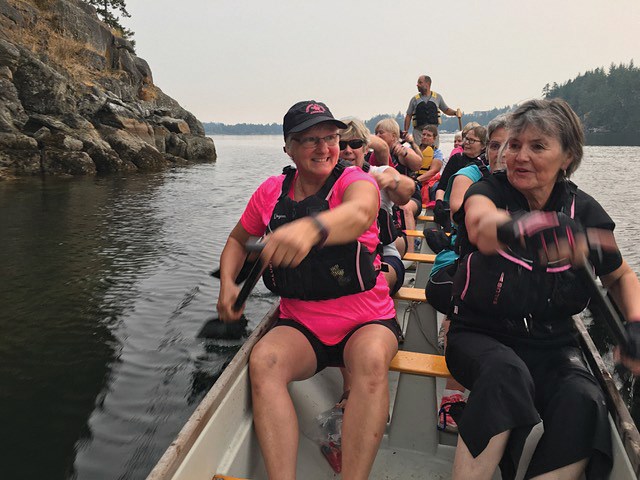We celebrate with provincial health officer Dr. Henry who said recently, “The light is brighter at the end of the tunnel.”
For many of us living with breast cancer that bright light is shining on our dragon boats and our hopes to be back on the water later this summer.
Our dragon boat team, Sunshine Dragons Abreast, is part of the larger Sunshine Coast Dragon Boat Association, comprised of five very active teams on the Coast.
The popularity of dragon boating for breast cancer survivors, here and internationally, is due in large part to earlier research in breast cancer and the findings that exercise does make a difference to outcomes. We now know that exercise is medicine.
Evidence shows exercise during and after cancer treatment reduces depression and anxiety, increases energy and strength, and reduces pain. Exercise for some cancers including breast cancer lowers risks for recurrence and mortality. Further, any level of exercise confers some benefit, but higher levels of exercise have better outcomes. And as a first, in 2019, Australia published national oncology guidelines that state exercise is to be embedded as standard practice in cancer care to counteract the adverse effects of cancer and its treatment.
Until the late 1990s, women with breast cancer were advised not to exercise the upper body as that type of exercise was thought to contribute to lymphedema, an incurable condition involving a swelling of arm and back related to lymph node radiation and/or removal in treatments.
Thousands of women who normally golfed, played tennis and did weight training were told to stop after diagnosis and treatment.
A friend of mine, a researcher at UBC, was told she could no longer play tennis after her diagnosis of breast cancer. She asked, “Where’s the research on that?” There was none.
The advice was based on a medical myth, a hypothesis that had never been tested. Dr. Don Mackenzie, a sport medicine physician at UBC, devised the first studies and chose dragon boating because it could be measured as an activity with a control group. He and colleagues in Vancouver created the first dragon boat team comprised of breast cancer survivors.
Early research findings, first published in 1996, showed no increase in lymphedema; rather, there were benefits across the board. Since then, multiple studies have demonstrated benefits.
As word of the benefits spread, breast cancer survivors became advocates and dragon boating for breast cancer survivors took off here and across the world.
There are hundreds of teams now and an International Breast Cancer Dragon Boat Association, which supports the development of new teams and hosts international races every four years.
On our coast, Gillian Kydd and her husband Ron retired to the family home in Roberts Creek in 2005. Working with other breast cancer survivors, Gill raised the funds to get our first boat. With the first boat on the water in 2006, a breast cancer team was formed and practices were set up. During ordinary times, soon to resume, you will find us in Sechelt Inlet, at Mackenzie Marina, practising Monday and Wednesday. Sechelt Inlet must be the most beautiful waterway to paddle in and we count our blessings each and every practice for this gift.
Our team, Sunshine Dragons Abreast, breast cancer survivors and supporters, includes the young and old, the fit and unfit, the thin and fat, the exercise fanatics and exercise adverse. We cover the human range and we welcome you to join us.
We know dragon boating makes a difference to our health and wellbeing.
We want you to experience this too. Please call Laurie at 778-462-2170 if you want more information.



